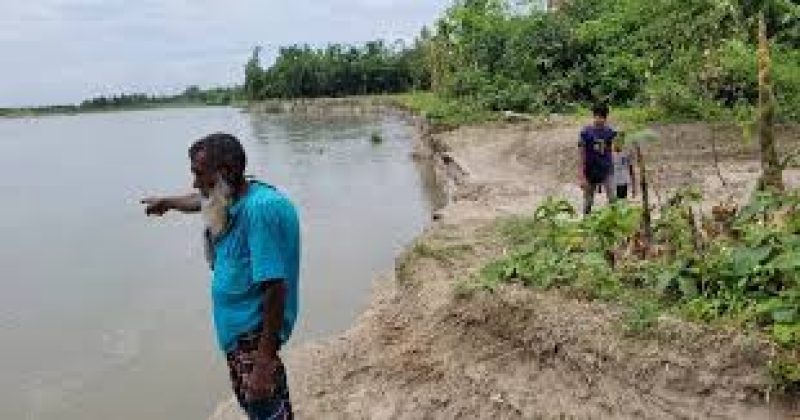- Israel Strikes Tehran with US Support Amid Nuclear Tensions |
- India Sees 9% Drop in Foreign Tourists as Bangladesh Visits Plunge |
- Dhaka Urges Restraint in Pakistan-Afghan War |
- Guterres Urges Action on Safe Migration Pact |
- OpenAI Raises $110B in Amazon-Led Funding |
Dharla River Erosion Leaves 50 Homeless, Hundreds at Risk

The once-distant murmur of the Dharla River has turned into a relentless roar—and with it comes devastation.
In Char Gorokmondol, a remote village in Kurigram’s Phulbari upazila, the river’s furious erosion has already swallowed more than 50 homes and hundreds of bighas of fertile land. Families are left broken and displaced, while nearly 500 more live under the looming threat of losing everything.
> “What can I say, brother? This is the fifth time my home has gone into the river. I have nothing left,” says 65-year-old shopkeeper Ala Boksh, his voice trembling with sorrow.
For the past four years, Ala and his wife have lived in makeshift shelters on borrowed land, scraping by with earnings from a small roadside shop in Anandabazar. But even that precarious lifeline is under threat, with the river now just meters away from their shelter.
He has begun shifting his meager belongings to his brother-in-law’s property. But without money, progress has stalled.
> “It’s like starting from nothing—again and again,” he says, his eyes heavy with despair.
Erosion is not new to the region, but the speed and scale this year are unprecedented. The advancing river not only threatens hundreds of families but also imperils newly built infrastructure—like the Mujib Kella disaster shelter, constructed at a cost of over Tk 2 crore.
Zahurul Islam, 35, and his wife Mahamuda Begum watch helplessly from their doorstep as the river inches closer.
> “We’re counting the days,” says Mahamuda. “It could be any moment now.”
In the village, fear and grief ripple through the community. Local youths Kamal Hossain and Abdul Quddus list the names of families already displaced this year—Zobed Ali, Monser Ali, Azibor Rahman, Azgor Ali—people who lost everything in the blink of an eye.
> “It’s not just land. It’s memories, livelihoods, roots—all gone,” laments Nur Alam.
Last year, the Dharla washed away 30 homes and half a kilometre of road in the same area, said Union Parishad member Ayaz Uddin. Authorities responded with 6,000 geobags—large sandbags meant to slow the erosion—but they proved insufficient.
> “This year, 500 more families, a school, a madrasa, and the Mujib Kella are all in danger,” Ayaz warned.
Naodanga Union Chairman Hossain Ali recently visited the site and pledged to seek emergency assistance from the Kurigram Water Development Board.
> “We can’t wait any longer,” he said.
But hope is running thin. Executive Engineer Raqibul Hasan said while 7,000 geobags were deployed last year, the current stock is depleted.
> “That area will require a significant number. Once new allocations arrive, we will supply them,” he assured.
Until then, the residents of Char Gorokmondol wait—powerless against the creeping advance of the river, clinging to what little remains.

